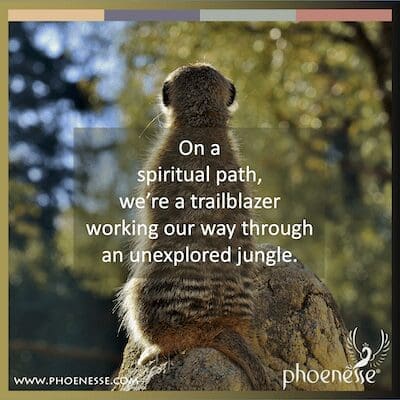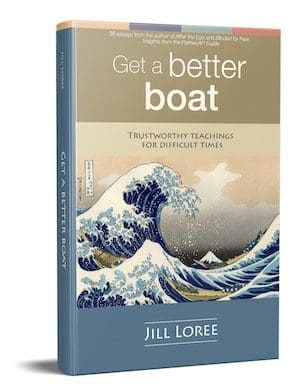
On a spiritual path, we’re a trailblazer working our way through an unexplored jungle.
To seek God is perhaps the most satisfying thing we can do. To find God, though, takes time. Yet seeking and finding are the only way to become free from our inner chains. And so we each must embark on a spiritual path.
What exactly does this mean, to be “on a spiritual path?”
For starters, it doesn’t mean we walk along a road that’s already there for us. No, when we decide to go this way, there isn’t a path yet. We have to make it. As such, we’re really then a trailblazer working our way through an unexplored jungle.
Along we must go, hacking our way through wild shrubbery and undergrowth, setting down one foot after another and making slow, steady progress. We must basically pick our way through the tangled landscape that now exists in our psyche.
In this self-created jungle, we are constantly building new forms by way of our behaviors and actions, our thoughts and feelings. So in every typical human soul, there will be such a jungle. That doesn’t mean we’re bad people. It merely means we’re full of confusion, error and lack of awareness. We are out of alignment with divine law, and we don’t know it.
It’s this ignorance that creates a wilderness we have to thrash our way through. And the final goal of all this effort? To find God.
Our personal hills and valleys
Because we’re stubborn and have various prejudices, we create conflicts—both inside us and in our outer lives. On our spiritual path, these will appear as rocks and boulders, as well as high mountains we will need to traverse to dissolve.
We’ll have to make our way through our faults, which will show up as thorny shrubs and poisonous plants. Now, instead of going around them or turning back, we’ll need to pick our way through them.
We’ll have to jump over gullies, which are our fears of life.
There will also be rivers to cross, where we must re-channel wild, raging waters. These are our out-of-control emotions that are running amok because we don’t understand where they’ve come from or what they’re really about. We’ll have to jump over gullies, which are our fears of life, as well as our fears of pain and disappointment.
In fact, what we’ll find is that to fully master life, we have to jump into the unknown. For the only way to lose our fears is to go through them. We can’t keep turning away from our self-made gullies, which wouldn’t even exist to begin with if we were able to understand life and take it as it comes. Indeed, it’s only after we become willing to leap that we’ll discover there wasn’t really any gully.
This jungle is for real
This jungle analogy isn’t just an analogy. These forms do, in fact, exist in our psyche. And when we set off on our spiritual path, we will need to find our way through such difficulties. For they actually do exist within us, in our subtle matter.
To go on this spiritual path is not easy. It’s a long climb up the steep side of a mountain, where the cliffs are often hidden in shadows and covered in darkness. At times, when we’ve had a small victory and the sun comes out, we’ll get to rest for a while. The scenery will be brighter and a little more friendly.
It’s a long climb up the steep side of a mountain.
Then off we’ll go again, ready to tackle the next bit. Sometimes we won’t be able to see the goal for a very long time. We may know what it is, but we will still be a long way from having a direct glimpse of it.
In fact, for quite a long time while we’re at the beginning of our path, it will probably feel as though we’re going around and around in circles. Because we’ll keep seeing the same scenery, over and over, as though we haven’t moved from where we started.
The arc of a spiritual path
If we don’t understand what’s going on, this can be very discouraging. What’s happening is that on a spiritual path, we are moving along on a spiral. And it’s inevitable that we must start out this way. For all our errors and ignorances, faults and wrong conclusions roll up to create a giant vicious circle in our soul.
On a spiritual path, we are moving along on a spiral.
What happens is that each of our individual faults interacts with all our other faults, creating a mess of chain reactions. To break out of it, we’ll need to separate our faults into individual buckets. By concentrating on one after the other, we’ll be able to find the links of cause and effect in our personal vicious circle. We can’t possibly understand the whole complicated circle completely after just one pass.
Going up?
After the first round, we’ll need to start again. But each time we start, we will gain a little more traction in understanding how our negative qualities are working together. Then we will stop experiencing our faults as these one-off events, and rather start to see them in our mind as a whole circle. Until we have this broader perspective, we’ll need to keep repeating the rounds.
At the beginning, this might seem like nonsense, like we’re getting nowhere. But that’s not true! And in fact, without going through this necessary part on the path, we can’t reach the light and become free. So the circle we’re spinning on is actually a spiral that gradually leads us upwards.
Going up feels better than going down
The path to self-awareness, then, does not follow a straight line. Not even a little. It actually goes up and down in spirals. It can happen that we are on a downward curve but are actually a step higher than during our last upward curve. It’s goofy like that.
And even though going up on our last self-development roller coaster ride was lower, on the whole, than our current downward motion, it probably felt better. Because heading up feels better than heading down. There’s a certain elation and freedom we feel going up—”Oh, now I see what’s been going on!”—that’s not there on the downward curve.
We dive into the darkness where confusion and error abound.
But the work we’ve already done on our spiritual path has helped us work our way up to a new level. Then down we go again, running into whatever conflicts we haven’t yet resolved. These conflicts, of course, bother us. We feel unsettled, restless and fearful, until we work them out and understand them.
At that point, we have fit them into the bigger picture, or into at least as much of it as we can now see. And from here we’re on the upward curve, enjoying the clearer air that naturally comes from pushing out the edges of truth a little further.
And then down we go once again, diving into the darkness where confusion and error abound. These are what cut us off from the flow of the divine stream. But in our confusion, we mix things up, saying things like, “This is depressing. I keep experiencing things I don’t like! And that’s why I am cut off from the divine flow.”
Why unpleasantness is good for us
The big trouble at this point is that we’re half right, which is always a dangerous situation. Yes, we’re experiencing unpleasantness. But this is only a reflection of something inside us waiting to be dug out. The unpleasantness is an unavoidable effect of a cause we ourselves have set into motion.
Every blessed victory means another upward curve.
It’s our inner problems—which are just waiting to be solved—that cut us off. But we become surrounded by this world of manifestation, and it frankly makes a strong impression on us. We’ve tasted the feeling of true reality before, but now it’s gone. Or at least it seems to be gone because we’re disconnected from it.
Actually, we need this disconnection because it calls us to battle—to lean into our faults. For that’s the only way to attain victory again. And every blessed victory means another upward curve.
But while we are riding through the rough patches, it’s natural that we won’t feel good, and we also won’t feel God. For we won’t yet resonate with the truth, and we can’t force this to happen with our will. What we can do, and should do, during difficult times is to think clearly about what we’re discovering. We can sift through our findings in light of what we now know.
For these are the times when it’s hard to pray. It’s hard to keep the faith.
Who wants to be happy?
Deep down, we all have a desire to be happy, and to make others happy. But at times like this, when we feel so disconnected, it’s hard to feel happy. For happiness is a byproduct of feeling unified and connected. So the idea of “secluded happiness” is not really possible.
Happiness is a byproduct of feeling unified and connected.
It’s our inner walls of separation that must crumble, which is exactly what we’re so afraid of. What we fail to realize is that when we keep shoring up our walls of separation, we defeat the purpose of living. Further, we scuttle our own self-development, which we also both desire and fear. In short, becoming happy means losing our separateness.
How does one go about losing their separateness? By doing the very thing that seems like the hardest thing to do. For many, this means giving up pride and going through what feels like tremendous shame. Yes, this is what it takes to let go of our walls and become happy.
What to pray for
And let’s be clear, God wants us to be happy. We have a long history of misunderstanding this, and instead believe that being godly means being unhappy and severe. Somehow godliness has gotten mixed up with martyrdom. All of humanity has gotten a dose of this wrong idea.
Godliness has gotten mixed up with martyrdom.
Friends, feeling happy is not a reason to feel guilty. And yet praying to become happy doesn’t work. What we need to pray for is the strength and ability to remove whatever obstacles we’ve placed between ourselves and happiness. Between ourselves and God.
To get where we want to go, we’ll have to go through the jungle of our unhappiness that we’ve inflicted on ourselves with our wrong thinking and errors.
And what will we get for all this effort? The clear light of peace, the joy of harmony, the beauty of living in freedom. It is in this spirit that we offer our prayers, asking God for help in making it through all the ups and downs of our healing work.
–The Guide’s wisdom in Jill Loree’s words

Adapted from Pathwork Guide Lecture #36: Prayer.
We can heal | AFTER THE EGO • BLINDED BY FEAR
The Real. Clear. series | HOLY MOLY • FINDING GOLD • BIBLE ME THIS • THE PULL • PEARLS • GEMS • BONES • NUTSHELLS
The Self. Care. series | SPILLING THE SCRIPT • HEALING THE HURT • DOING THE WORK
More spiritual books | WALKER (a memoir) • SPIRITUAL LAWS • WORD FOR WORD • KEYS (Pathwork Q&As)


